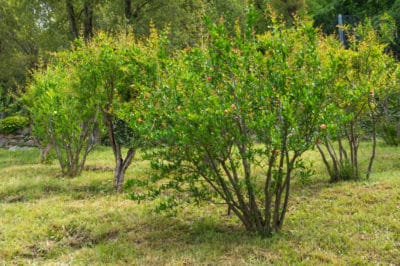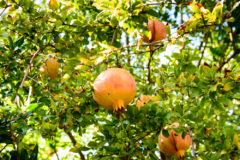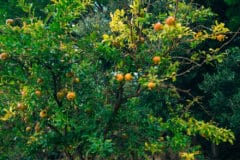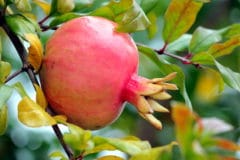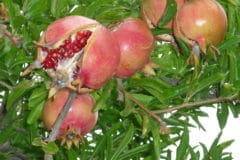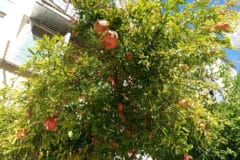Training Pomegranates as Trees
In their natural form, pomegranates grow as multi-stemmed, upright to slightly drooping shrubs. They spread by sending out suckers from their bases. Depending on the cultivar, pomegranate shrubs reach up to 20 feet high and 15 feet wide. To conserve space and allow for easier harvesting, many growers train them as multi- or single-trunked trees.
Growing Pomegranates as Multi-Trunked Trees
Depending on cultivar, pomegranates grow in USDA plant hardiness zones 6 through 11. The most cold-hardy ones tolerate winter lows down to 3°F (-15.5°C), but most aren’t that tough. By growing them as multi-trunked trees, you can simply remove the dead trunks and replace them with healthy, vigorous suckers.
To train a multi-trunked pomegranate:
- In the spring of the first year after planting, remove all but three to six of the most vigorous suckers.
- Let the selected suckers to grow into trunks.
- Prune all other suckers to the ground as soon as they sprout.
Expert gardener’s tip: Commercial growers recommend a limit of six trunks. Otherwise, the tree will channel its energy into growing wood and foliage instead of fruit.
Training a Single-Trunked Pomegranate Tree
To train your pomegranate to a single trunk:
- After planting, prune all the branches growing lower than 1 foot above the soil.
- Select five to seven of the strongest remaining branches for your scaffold. Remove the rest.
- The following winter, prune the scaffold branches back by three-fifths.
Expert gardener’s tip: If your tree has no suitable scaffold branches, cut its trunk back to 2 or 2 ½ feet. Over the summer, it will grow some.
Ensuring Fruit Production
Whether on a tree or bush, all pomegranate fruit grows the same way – on new shoots sprouting from wood more than one year old. To ensure your future harvests, never prune more than one-third of the new growth in any year.
What to Expect
While pomegranates often bear fruit within a year after planting, they usually need five or six years to yield a full-sized crop. When ripe, the fruit will deepen to its mature color, feel heavy and make a metallic noise when you tap it lightly. It won’t ripen off the tree.
